Traditional medicine has been around for centuries and offers a holistic approach to health and well-being. It encompasses a wide range of healing practices and therapies that have been passed down through generations.
From herbal medicines and traditional healing systems like Traditional Chinese Medicine (TCM) and Indian Ayurveda to African traditional medicine and natural products, traditional medicine is a fascinating realm with a lot of potential to offer.
Traditional remedies, polyherbal preparations, medicinal plants, and indigenous beliefs all play a significant role in traditional healing methods. Alternative medicine practices rooted in indigenous cultures have unique contributions to holistic healing, making traditional medicine an exciting field to explore.
This article will take a modern look at traditional medicine, exploring the secrets of ancient remedies and uncovering the potential of improved traditional medicines.
- Traditional medicine offers a holistic approach to health and well-being.
- Herbal medicines, TCM, Indian Ayurveda, and African traditional medicine are some of the traditional healing practices around the world.
- Improved traditional medicines, medicinal plants, and polyherbal preparations have potential to enhance wellness.
- Indigenous beliefs and alternative medicine are significant contributors to traditional medicine.
- Natural remedies have a timeless appeal and have been used for centuries to address health conditions.
Traditional Medicine: An Ancient Art of Healing
Indigenous medicine is a time-honored tradition that has been practiced for centuries. The ancient healing practices have been passed down from generation to generation, providing a wealth of knowledge and experience in traditional healing methods. One of the most notable forms of indigenous medicine is herbal medicine, which involves the use of medicinal plants for healing.
The traditional healing methods encompass a holistic approach to health and well-being, taking into account the mind, body, and spirit. The emphasis is on prevention, rather than just curing illness. This approach is known as complementary medicine, which includes traditional healing methods alongside modern medicine.
Throughout history, indigenous medicine has played a significant role in the lives of people around the world. The traditional healing practices have been used to treat a variety of ailments, from physical to mental health issues. The use of herbal medicine has been particularly effective in treating common conditions such as headaches, colds, and digestive problems.
As the world continues to evolve, we are rediscovering the power of traditional medicine. The ancient healing practices are gaining recognition for their effectiveness and natural ability to promote healing. As we embrace the wisdom of indigenous medicine, we open ourselves up to a world of possibilities in holistic healing.
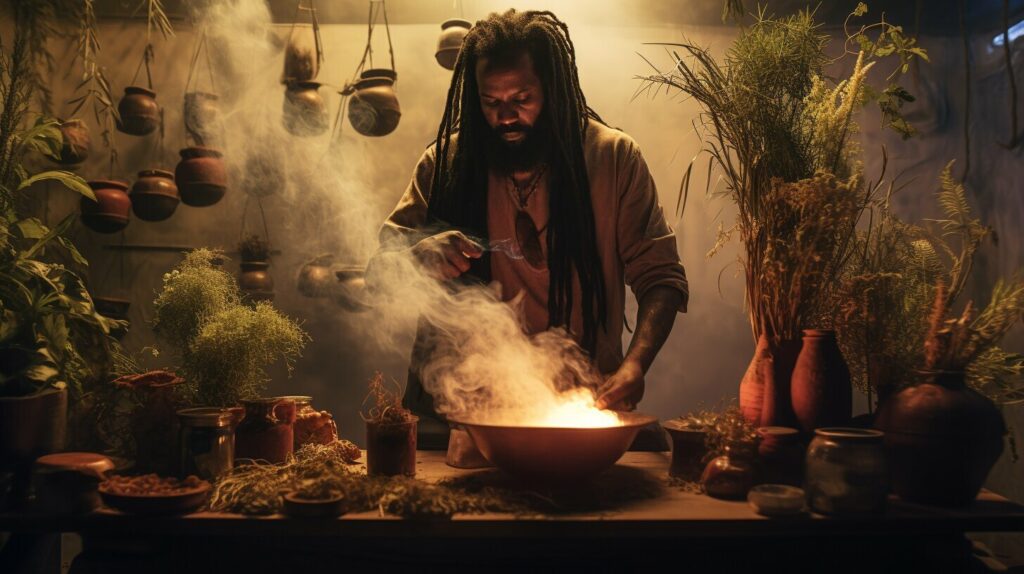
“The traditional healing methods encompass a holistic approach to health and well-being.”
Exploring Traditional Chinese Medicine (TCM)
Traditional Chinese Medicine (TCM) is one of the oldest and most comprehensive traditional healing systems in the world. With a history of over 2,500 years, TCM has been used to treat a wide range of health conditions and promote overall well-being. The foundation of TCM lies in the belief that the human body is a complex system of interconnected energies, and any imbalance in these energies can lead to illness and disease.
Herbal remedies are a key component of TCM, with over 5,700 medicinal substances derived from plants. These remedies are often combined in polyherbal preparations to create a synergistic effect. The use of herbal remedies is based on the principle of “treating like with like” and is customized to meet the individual needs of the patient.
TCM also encompasses various traditional healing systems, including acupuncture, acupressure, and moxibustion. Acupuncture involves the insertion of fine needles into specific points on the body to stimulate the flow of energy and restore balance. Acupressure uses finger pressure on specific points, while moxibustion involves the burning of a specific herb to stimulate energy flow.
TCM is a holistic healing system that addresses the root cause of the illness rather than simply treating the symptoms. By promoting balance and harmony within the body, TCM offers a unique approach to achieving optimal health.
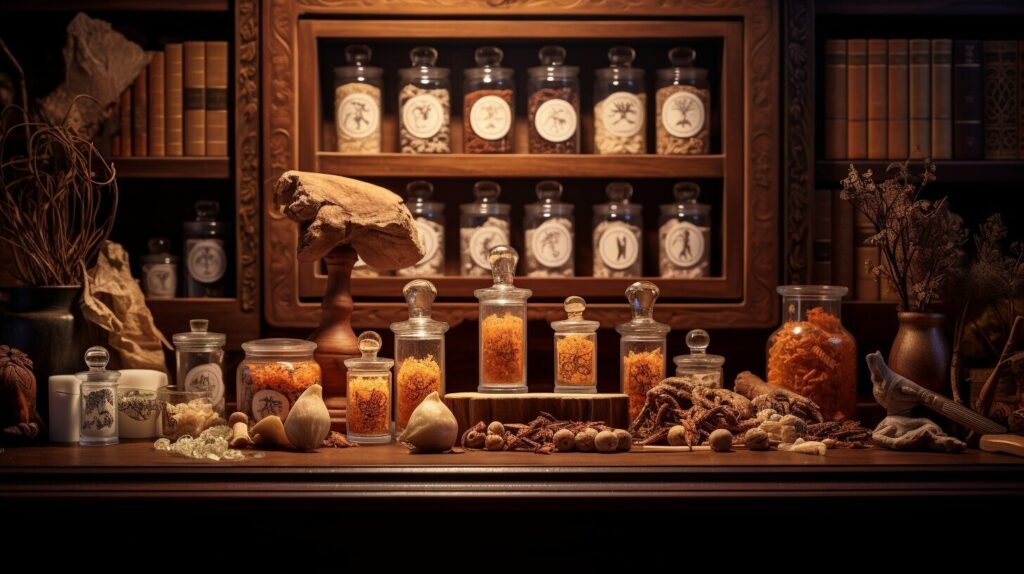
Ayurveda, often referred to as the “science of life,” is an ancient Indian system of medicine that focuses on achieving balance and harmony in the body, mind, and spirit. The use of traditional remedies and holistic healing practices is at the core of Ayurveda. Its principles are based on the belief that the body is made up of three doshas or energies — Vata, Pitta, and Kapha. These energies need to be in balance for optimal health. Traditional Ayurvedic remedies focus on natural ingredients such as herbs, spices, and minerals, and aim to restore balance in the body.
Ayurveda’s holistic approach to healing considers not only the physical symptoms of an individual but also their mental, emotional, and spiritual health. By promoting overall well-being, Ayurveda aims to prevent illness and promote longevity. The traditional remedies used in Ayurveda include herbal preparations, oil massages, and dietary guidelines tailored to each individual’s dosha type.
Discover the wisdom of Ayurvedic lifestyle and learn how it can enhance your overall well-being. The holistic healing practices of Ayurveda may offer a natural and effective alternative to conventional medicine.
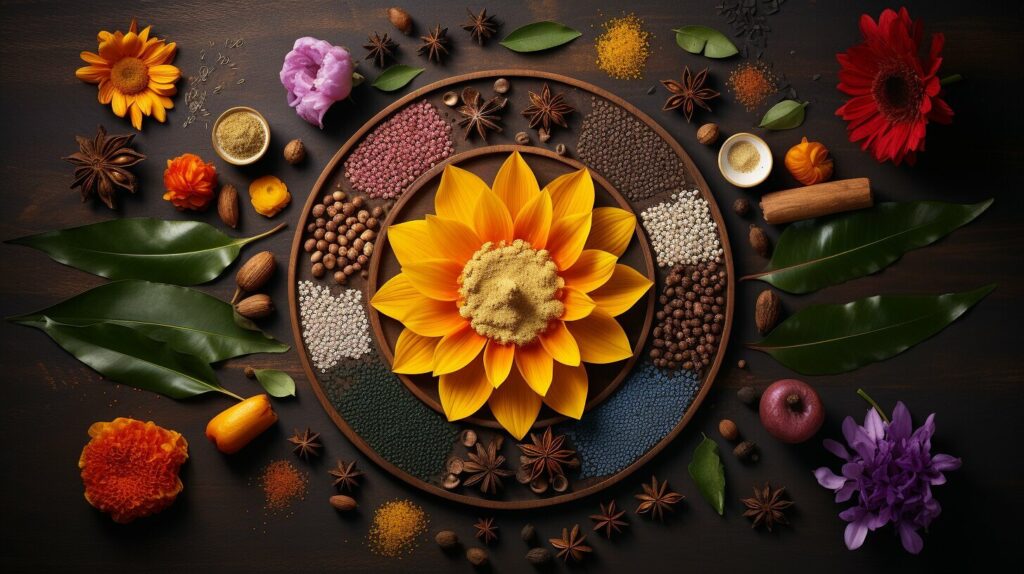
Unveiling the Power of African Traditional Medicine
African traditional medicine is a rich and diverse healing tradition that has been practiced by indigenous communities across the African continent for centuries. The traditional healing practices in Africa are deeply rooted in the cultural beliefs and values of the people.
Herbal medicines play a significant role in African traditional medicine. The use of herbs, plants, and other natural remedies is an essential aspect of treating and preventing illnesses. Herbal medicines are often combined with spiritual and physical therapies to promote overall health and well-being.
The traditional healing practices in Africa also involve a strong emphasis on community involvement. It is believed that the health and well-being of an individual is interconnected with that of the community. Thus, many traditional healers work closely with their communities to address health issues and promote wellness.
Despite the influence of Western medicine, traditional healing practices remain an essential part of African culture. The use of herbal medicines and traditional healing practices continues to play a significant role in the healthcare system of many African countries.
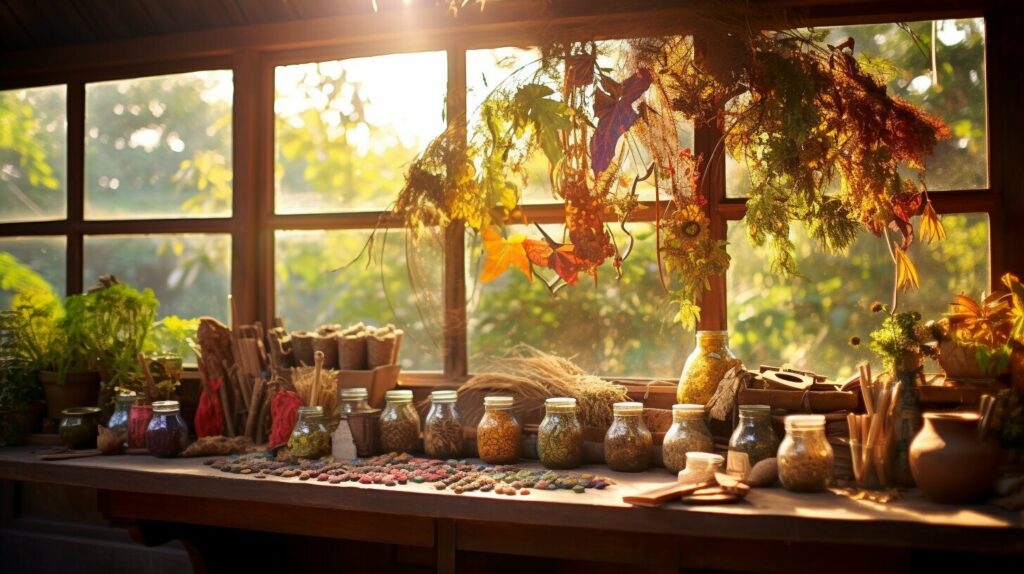
The Potential of Improved Traditional Medicines
Traditional medicines have been used for centuries to promote health and wellness. With modern research, there is potential to improve these traditional medicines and make them even more effective. Natural products derived from traditional healing practices have been found to have various health benefits.
One such benefit is the antioxidant properties of certain traditional remedies. Antioxidants are substances that protect the body from damage caused by harmful molecules called free radicals. Research has shown that some traditional remedies contain high levels of antioxidant compounds, such as flavonoids and phenolic acids. These compounds have been found to have anti-inflammatory and anti-cancer properties, among other health benefits.
Improved traditional medicines also include the use of natural products, such as medicinal plants. These plants contain various bioactive compounds that have therapeutic properties. For example, the antioxidant genus contains various medicinal plants that can boost the immune system, reduce inflammation, and promote overall well-being.

By improving traditional medicines, we can unlock their full potential and offer a natural and holistic approach to health and wellness. The use of natural products and traditional remedies can offer various benefits without the side effects often associated with modern medicine.
The Role of Medicinal Plants in Traditional Medicine
Medicinal plants have been used in traditional medicine systems for centuries. Herbal medicines are an essential part of traditional healing practices and are derived from various parts of plants, including leaves, roots, and flowers. These natural remedies offer a holistic approach to health and wellness that has stood the test of time.
Traditional remedies made from medicinal plants have been used to treat a wide range of health conditions, including digestive problems, respiratory illnesses, and skin conditions. These natural remedies are often preferred by individuals seeking a gentler approach to healing.
One of the advantages of using medicinal plants is their availability. Many of these plants can be found in the surrounding environment, making them easily accessible to communities. This has been particularly important in areas where access to modern healthcare is limited.
| Medicinal Plant | Traditional Use |
|---|---|
| Echinacea | Boosting the immune system |
| Ginger | Nausea and vomiting |
| Aloe Vera | Skin irritation |
Medicinal plants continue to play a significant role in traditional medicine systems worldwide. They are often considered a safer and more natural alternative to modern medicines. However, it is important to note that herbal medicines can also have side effects and interactions with other medications.

Despite the advancements in modern medicine, the use of medicinal plants in traditional healing practices remains relevant. The therapeutic properties of these natural remedies continue to be explored, providing opportunities for improved traditional medicines.
In the next section, we will explore the role of indigenous beliefs in traditional healing methods.
Indigenous Beliefs and Traditional Healing Methods
Indigenous beliefs have played a significant role in traditional healing methods for centuries. These beliefs are deeply rooted in cultural and spiritual practices that influence the approach to health and well-being.
Alternative medicine practices, such as Traditional Chinese Medicine and Indian Ayurveda, often incorporate these indigenous beliefs into their healing systems. For example, TCM emphasizes the balance of yin and yang in the body and mind, influenced by Daoist philosophy. Indian Ayurveda focuses on the balance of three doshas, or energy types, which are influenced by an individual’s unique constitution and lifestyle.
These traditional healing methods also recognize the interconnectedness of mind, body, and spirit in achieving overall wellness. They incorporate practices such as meditation, prayer, and energetic healing techniques to address not just physical ailments but also emotional and spiritual imbalances.
Today, many individuals are turning to alternative medicine practices rooted in indigenous beliefs to complement Western medical treatments. The holistic approach to healing and emphasis on individualized care make these practices appealing to those seeking a more personalized and comprehensive approach to their health.

“Traditional healing practices from around the world offer unique insights and approaches to health and wellness.”
The Appeal of Natural Remedies
When it comes to addressing common health conditions, many individuals turn to natural remedies for relief. Natural remedies have been used for centuries in traditional medicine systems and continue to be a popular choice for those seeking a holistic approach to wellness. These remedies are often derived from herbal medicines and ancient remedies that have been passed down through generations.
Herbal remedies are a key component of traditional medicine systems, and their use in natural remedies can be traced back to ancient times. Plants have been used for their therapeutic properties for centuries, and modern research has shown that many of these plants contain powerful compounds that can support overall well-being. From chamomile tea for relaxation to ginger for nausea, herbal remedies offer a wide range of natural options for addressing common ailments.
Ancient remedies, such as those found in Ayurveda and Traditional Chinese Medicine (TCM), also continue to hold widespread appeal. These remedies are often based on holistic healing practices and can include a combination of herbal remedies, massage, and meditation. With a focus on achieving balance and harmony in the body, mind, and spirit, ancient remedies offer a comprehensive approach to wellness.
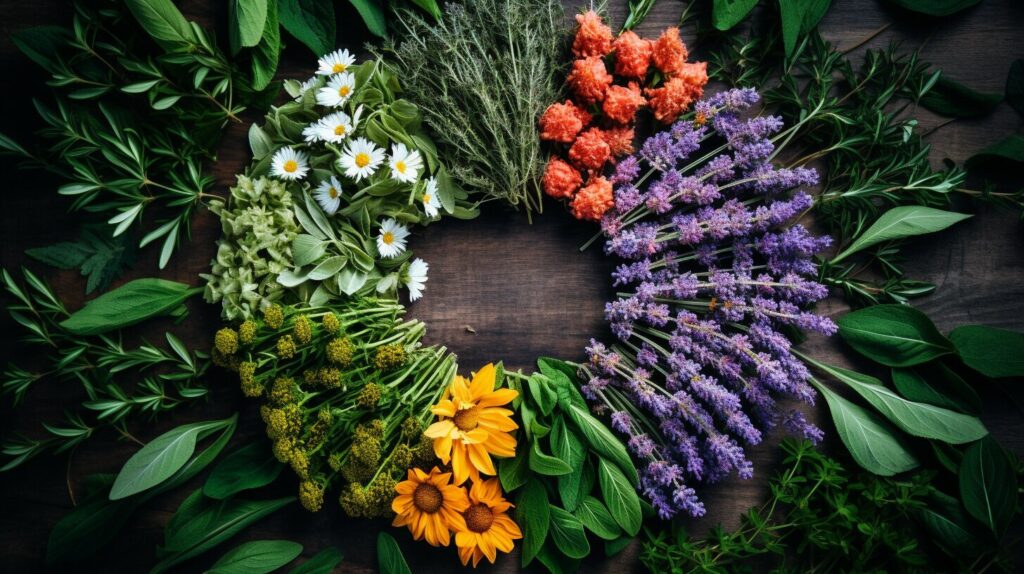
Whether you are seeking relief from a headache or looking to boost your overall health and wellness, natural remedies offer a safe and effective alternative to conventional medicine. By incorporating these remedies into your daily routine, you can tap into the wisdom of traditional medicine systems and unlock the power of herbal and ancient remedies.
Traditional Medicine in Modern Times
Traditional healing practices have stood the test of time and continue to gain momentum in modern times. With a growing awareness of the benefits of holistic healing approaches, traditional medicine has found its place in mainstream healthcare.
From acupuncture and herbal remedies to energy healing and meditation, holistic healing practices have gained popularity for their ability to address both physical and emotional concerns. Modern medicine has embraced ancient healing practices, recognizing their potential as complementary therapies in conventional treatments.
As you seek to enhance your overall well-being, traditional healing practices can provide a viable option. By taking a holistic approach to healing, traditional medicine focuses on treating the root cause of health issues rather than just the symptoms.
Ancient healing practices have stood the test of time, and their relevance in modern times is undeniable. By incorporating traditional healing practices into your lifestyle, you can unlock the secrets of ancient healing and support your overall health and wellness.

Conclusion
Traditional medicine offers a wealth of knowledge and wisdom that can enhance your health journey. From herbal medicines and traditional healing systems to ancient remedies and holistic healing practices, traditional medicine provides a holistic approach to well-being.
By exploring the traditional healing practices of different cultures, you can discover the power of natural products and the potential of improved traditional medicines. Through the use of medicinal plants, traditional remedies, and polyherbal preparations, you can address a wide range of health conditions.
The Integration of Traditional Medicine into Modern Healthcare
As traditional medicine continues to thrive in modern times, it is being integrated into mainstream healthcare. Many healthcare providers are recognizing the holistic healing approach of traditional medicine and incorporating it into their treatment plans.
Whether you seek to enhance your wellness through natural remedies or explore the rich history of traditional medicine, the world of ancient healing practices is waiting for you. By embracing the power of traditional medicine, you can unlock the secrets of holistic healing and support your overall health and well-being.
FAQ
What is traditional medicine?
Traditional medicine refers to the healing practices and therapies that have been passed down through generations in indigenous cultures around the world. It encompasses a wide range of holistic approaches to health and well-being, including the use of herbal medicines, ancient healing practices, and traditional remedies.
What are some examples of traditional medicine?
Some examples of traditional medicine include Traditional Chinese Medicine (TCM), Indian Ayurveda, African traditional medicine, and various indigenous healing practices. These systems of medicine often rely on natural remedies, herbal medicines, and holistic healing methods.
How long has traditional medicine been practiced?
Traditional medicine has been practiced for centuries and is deeply rooted in indigenous cultures. These healing practices have been passed down through generations and continue to be relevant in modern times, with many individuals seeking alternative approaches to health and well-being.
What is the role of medicinal plants in traditional medicine?
Medicinal plants play a crucial role in traditional medicine systems. They are often used to create herbal remedies and are known for their therapeutic properties. Traditional healing methods rely on the knowledge of these plants and their traditional uses to treat various ailments and promote overall wellness.
How does traditional medicine differ from modern medicine?
Traditional medicine takes a holistic approach to health and well-being, focusing on the balance and harmony of the body, mind, and spirit. It often incorporates natural remedies, traditional healing practices, and indigenous beliefs. In contrast, modern medicine may rely more on pharmaceutical drugs and technological interventions to treat specific symptoms or diseases.
Is traditional medicine scientifically proven?
While traditional medicine may not always have the same level of scientific evidence as modern medicine, many traditional healing practices have been studied and are recognized for their efficacy. Furthermore, traditional medicine has stood the test of time, with generations of individuals benefiting from its holistic approach to health and well-being.
Can traditional medicine be used alongside modern medicine?
Yes, traditional medicine can often be used alongside modern medicine. It is important to consult with healthcare professionals and practitioners of traditional medicine to ensure a safe and integrated approach to your health journey. Traditional and modern medicine can complement each other to provide holistic care and support.
Are there any risks or side effects associated with traditional medicine?
As with any form of healthcare, there can be risks and side effects associated with traditional medicine. It is important to work with qualified practitioners and inform them of any pre-existing medical conditions or medications you are taking. They can provide guidance on the appropriate use and potential risks of traditional remedies.
Can traditional medicine be used for prevention?
Yes, traditional medicine often emphasizes the importance of preventive care and maintaining balance within the body. Many traditional healing practices, such as dietary therapy and lifestyle recommendations, can be used proactively to support overall health and well-being.
Where can I find qualified practitioners of traditional medicine?
Qualified practitioners of traditional medicine can be found in various settings, including specialized clinics, wellness centers, and integrative healthcare practices. It is important to research and ensure that the practitioners you choose are properly trained and accredited in their respective healing modalities.